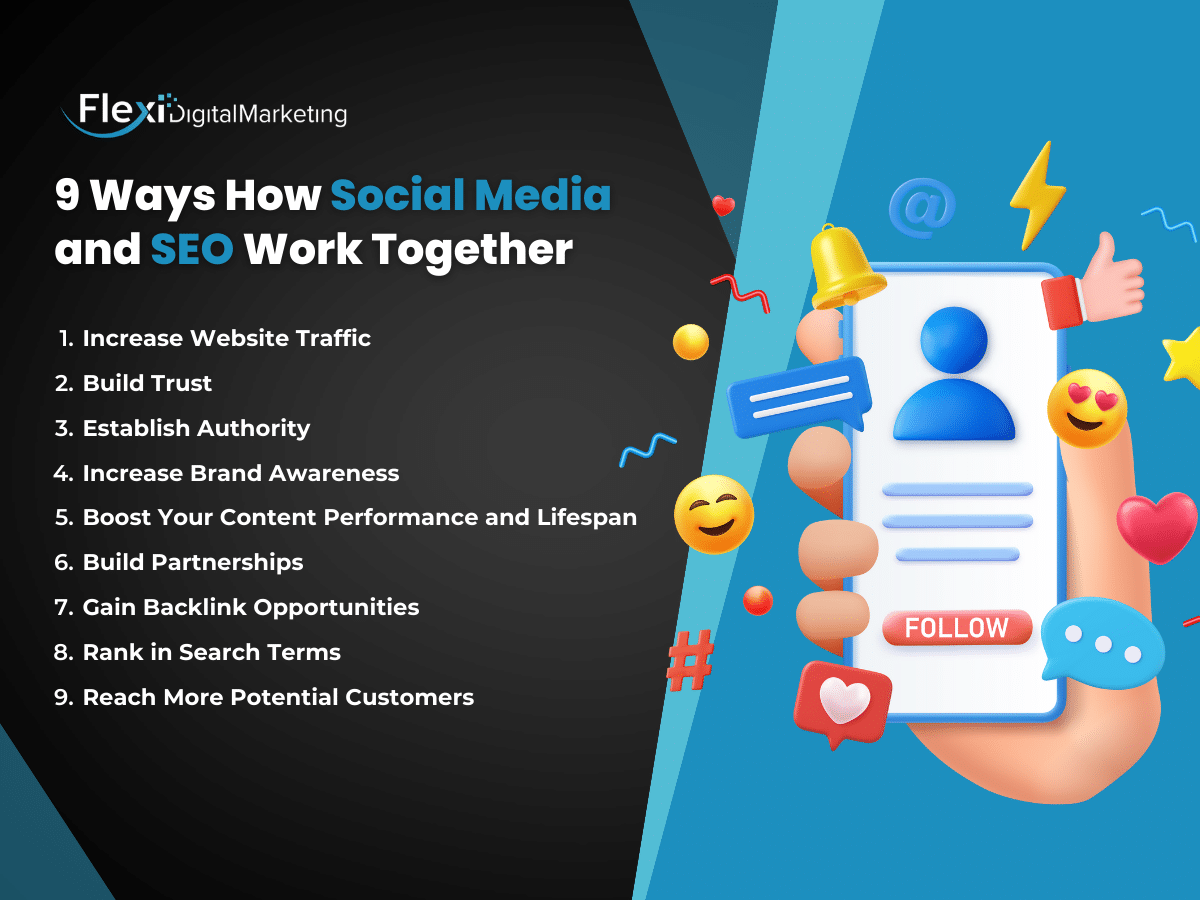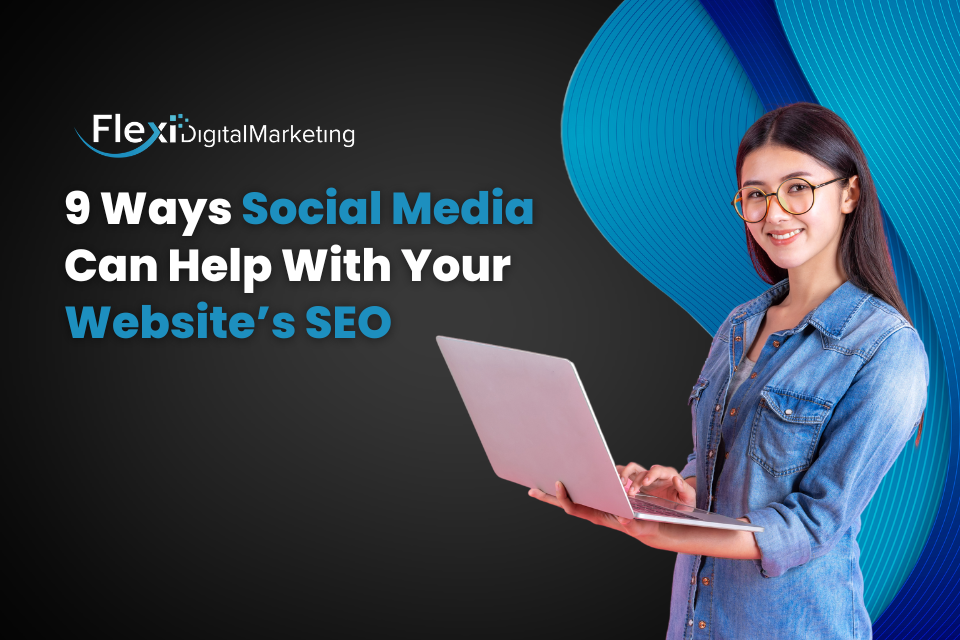There is no denying that social media and SEO are important digital marketing tools for businesses to thrive in the digital space.
Each one of these tools has its own specific uses. For businesses, social media can help them reach new customers and actively engage with their audience. While search engine optimization (SEO) helps businesses ensure that their content reaches the right people at the right time.
These two tools can create a powerful marketing synergy. In turn, these can help companies effectively reach their target audiences, grow their customer base, and, ultimately, grow their business.
So, to help you do just that, we will look at the relationship between SEO and social media and how you can maximise their effectiveness and help you reach your goals.
How is SEO linked to social media?
SEO and social media marketing go hand in hand. Social media serves as a platform for businesses to share and promote content, even content from their websites. In turn, these are then indexed by search engines and taken into consideration when they are determining rankings.
Moreover, social media also provides a direct channel for a business to engage with its audiences and encourage more people to visit its website. This can contribute to higher rankings in search engine results. As such, it is clear that SEO and social media are complementary forces for digital marketing.
It is important to note that the relationship between SEO and social media differs case-by-case.
Google's search engine algorithms consider social signals from social networking platforms to some degree. But, it does not directly affect website rankings. On the other hand, social media engagements do have a direct effect on Bing's search rankings.
What is SEO social?
This is a term that may be new for some. This actually refers to the relationship between SEO and social media.
To be specific, it describes the use of social media to improve a website’s SEO performance. This encompasses producing shareable and engaging content to increase the number of backlinks and social engagements that lead to the website.
There are 5 ways to maximize SEO and social media using SEO social:
- Optimise social media profiles.
- Adapt existing content or create content specifically for social networking platforms.
- Actively engage with the audiences and influencers.
- Use keywords in captions.
- Encourage the audience to visit the company’s website and other official social media channels.
Does social media affect SEO?
The short answer is: Only to some degree. Social media does help a website’s visibility to some extent. But, SEO-wise, it depends on the search engine you are trying to rank on.
There are a lot of ways that social media can help SEO. It can provide a platform for businesses to share and promote content. This is another factor that search engines take into account when determining rankings.
What is the best social media SEO?
With that said, which social media platforms work best for SEO?
Google My Business and LinkedIn are the best platforms that are best suited for businesses. Companies can create their profile, post industry-related content, and connect with other brands and figures.
However, between these two, Google My Business is the most effective platform for SEO. It can help increase the visibility of a business's website and provide analytics of the progress using other tools created by Google.
Is SEO needed for social media?
SEO is not strictly required for social media. But it can be a big help for businesses to maximise the effectiveness of their social media campaigns. In addition, SEO can help social media marketing in a couple of ways.
- Get content to be seen.
- Grow a social media channel faster.
- Reach more potential customers outside of the traditional search route.
9 Ways How Social Media and SEO Work Together
With that said, here are a few ways to improve your website’s search engine rankings with social media and SEO. Listed below is a comprehensive overview of how to utilise social media to boost SEO and increase organic website traffic.
Increase Website Traffic
There are a couple of ways to increase website traffic. Social media platforms can be used to share content and build relationships with customers. Companies can also use social media to link back to their website. This is important for SEO as it helps increase the number of backlinks to a website.
A strong presence can help increase a website’s ranking since social signals and engagements are taken into account to a certain degree. Plus, social media can be used to conduct keyword research, identify relevant topics, and create content that appeals to the target audience.
Build Trust
Trust is important for a lot of consumers, especially now that there are more options. However, not all businesses are reliable or provide excellent service; some may even be fake. Social media and SEO can help build that much-needed trust.
Social media can reach more people, humanise a brand, and actively engage with customers. While SEO presents an opportunity to showcase the company’s expertise in a particular field, these two factors working in tandem can help establish and strengthen brand trust and reputation.

Establish Authority
Social media and SEO help businesses establish authority. Consistently producing and publishing high-quality, helpful content can only do so much without these two factors.
It is important to implement good SEO practices to help published content become more visible. As such, search engine algorithms evaluate websites based on these practices and the quality of their content to determine their authority, trustworthiness, and, ultimately, search result rank.
Increase Brand Awareness
Increasing brand awareness is not only about becoming popular. Businesses can be well-known for good reasons or bad reasons. Social media and SEO play a big role in projecting the persona of a brand and the overall perception conceived by the audience.
For SEO, becoming an authority figure for a niche subject and producing relevant and valuable content is one way to achieve this. While for social media, a way to achieve this is by sharing valuable content and actively engaging with the audience and brand-centred community, as well as partnering with relevant influencers with a large following.
Boost Your Content Performance and Lifespan
It takes time to plan, ideate, and produce high-quality content. Most digital marketers maximise the use of their content by reusing, resharing, and recirculating it. This ensures the lifespan of the content lasts longer and performs better in the long run.
With that said, SEO already plays the long game. Still, it is important to ensure the content is optimised for search engine crawlers. A way to utilise it further is to do cross-publishing on publishing platforms like Medium and LinkedIn, to name a few.
On the other hand, you can boost content performance and lifespan for social media by doing a couple of things:
- Utilise targeted ads.
- Recycle blog articles into bite-sized shareable multimedia content.
- Answer audience and customer queries and share article links to add more value.
- Partner with influencers and use existing content as source material.
Build Partnerships
Social media and SEO also present businesses with an opportunity to build potential partnerships. There are a couple of relationships that these two tools can help build:
- Brand advocates
- Influencers
- Strategic partners
Actively engaging with people on social media can help establish the first form of contact. But, to take it a step further, companies can list the accounts of other businesses that are relevant to the business and brand evangelists.
Gain Backlink Opportunities
Backlink opportunities are not easy to come by. It can happen between collaborators or partners, but the rest is really up to chance.
Backlinking usually happens when a third party takes action without any direct prompting from the content creator. That is why a lot of great content, which takes extensive research and production time, gets little to no engagement.
But with the help of social media and SEO, people can discover these materials and leave a lasting impression. Some people even go so far as to bookmark these pages for future reference and cite them in their posts.
Of course, a link on Facebook or any other social media platform may not be the same as a backlink. But it still spreads awareness, which increases its visibility and chances to be back-linked with other websites down the line.
Rank in Search Terms
A website’s search results rank and SEO performance are important. But a company's social media presence and visibility are essential as well. That is why when people search for a company using branded terms, their social profile also has the potential to rank alongside their website.
With that said, businesses should capitalise on this chance to rank for branded searches. It is a clear indication that people are already interested in the brand and what the company offers.
Reach More Potential Customers
Ultimately, the marketing synergy between social media and SEO all boils down to reaching more potential customers. Leveraging these two tools casts a wider net and increases visibility among the targeted audience.
Moreover, building a trustworthy brand on social media and being regarded as an authority figure in a niche are essential. These two factors help increase the conversion rate and retain more customers down the line.
How to Integrate Social Media and SEO in Your Digital Marketing Campaign
Knowing the multiple ways to combine social media strategies with SEO strategies is important. It presents marketers with a new perspective and way to approach digital marketing.
However, just combining these two tools does not immediately yield the desired results. In fact, marketers need to carefully balance these two to find the perfect marketing synergy. While it will take a lot of work and fine-tuning, it will all be worth it.
Finding the sweet spot between social media and SEO can be challenging. But you do not have to do it alone. Contact us today and let’s start your digital marketing projects together!


